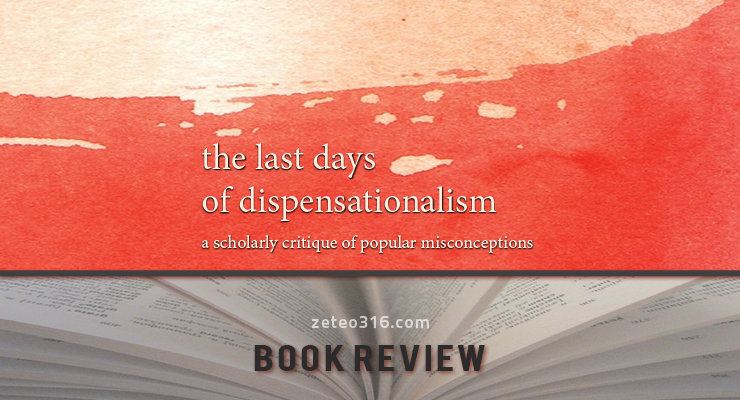The Last Days of Dispensationalism. What an intriguing title for a book! Does the book claim to hammer the last nail in the dispensational coffin? Or is it a word play on the fact that dispensationalism is associated with prophecy? Or perhaps it’s both?
Following below will be a link to an offsite review of Alistair W. Donaldson’s book “the last of dispensationalism – a scholarly critique of popular misconceptions.” The book is published by Wipf and Stock Publishers (paperback 168 pages).
According to his Laidlaw College bio, Donaldson has a Master of Theology (MTh) degree in the field of eschatology. He is also a lecturer in the School of Theology teaching Biblical Theology, Biblical Studies and Hermeneutics.
The Last Days of Dispensationalism (TLDoD) isn’t the kind of book which flies off the shelves. I became aware of it while researching anti-Zionist materials. Stephen Sizer (Christian Zionism: Road-map to Armageddon?) gave it a plug. Sizer also wrote a glowing Foreword to the book. Both Sizer and Donaldson are outspoken critics of Israel and Christian Zionism.
The Contents reveal the scope of the book:
1) The Hermeneutics of Dispensational Premillennialism: A Critique (Donaldson is amillennial)
2) Who Is Israel?: A Discussion of Dispensational and Non-Dispensational Perspectives
3) The Kingdom of God
4) The Rapture and the Tribulation
5) The Millennium
6) Earthing Our Eschatology
TLDoD suffers from lack of an Appendix and Scripture List.
The bibliography is revealing. If you’re critiquing dispensationalism, you ought to take on its best defenders. Hagee, LaHaye and Lindsey won’t cut it. Yet there are references to popular (and woeful) polemics of the likes of Adventist Steve Wohlberg, ELCA Minister Barbara Rossing and Catholic David Currie etc. Along with them he trots out the usual non-dispensational heavy weights: Wright, the obligatory DeMar, Robertson, Riddlebarger, Hoekema, Gerstner etc. The interaction with Walvoord, Ryrie and others is minimal and then only to set them up.
There is no recognition of Alva McClain’s Greatness of the Kingdom in his chapter on the kingdom. McClain’s book responds to Donaldson’s alleged problems with the dispensational view. Donaldson purposely doesn’t interact with Progressive Dispensationalism. He erroneously asserts that PD has moved closer to Covenant Theology, anyway (Introduction, xiv footnote 6). However, a “scholastic” interaction with Robert Saucy’s PD book would have posed difficulties with his assertions that the NT reinterprets the OT; and that the “one people of God” cannot include a distinctive role for national Israel. Notably, Saucy’s book is far closer to Normative Dispensationalism than Donaldson’s amillennialism is to postmillennialism (which he feels a kinship to). See also Michael Vlach’s Has the Church Replaced Israel?
Typical of these efforts, Donaldson appeals to Darby and Margaret MacDonald etc. These are tired old canards which expose lack of scholarship. See William Watson’s Dispensationalism Before Darby. Especially egregious is his claim that: “dispensationalism is not a well-reasoned understanding of biblical redemption.” Quite an ironical statement considering the author rejects national Israel’s redemption and return to its own land as promised.
I’ve wanted to do a review of TLDoD for some time because it is representative of the anti-dispensational genre. The problem is Donaldson’s book is a page-turner of straw men and red herring material. It’s impossible to adequately address it in limited space, and it’s a lot of work. His expertise is listed as being in the areas of hermeneutics and eschatology. So, when he writes a purported scholastic polemic against a “seriously flawed” dispensationalist hermeneutic, he ought to be responded to.
Fortunately, Sam Mangai has written an incisive 17 page review of TLDoD. He picked up on many of the points I wanted to highlight. Are Donaldson’s hermeneutics really superior to dispensationalism’s? Mangai even mentions Paul Henebury’s Rules of Affinity and his Forty Reasons for not reinterpreting the OT using the NT. He writes:
I found the ‘Rules of Affinity’, created by Dr. Paul Henebury, to be a useful and helpful device to employ while reading through this chapter. Dr. Henebury’s device allows one to measure the, “propositional distance between any given statement of a doctrine and the biblical passages used to support it”.
I urge you to read Mangai’s review as it is a very, very good interaction with Donaldson’s polemics. The last chapter sums it up accurately:
In conclusion, I found ‘the last days of dispensationalism’ to be more image than substance. It was not the ‘scholarly critique’ I had hoped for, but the polemical ranting of an anti-Israeli supersessionist. It’s laughable to suggest – as the title to the book so proudly does – that this collection of pseudo-biblical, theo-political sound bites has sounded the death knell for biblical dispensationalism. In reality, Donaldson’s ‘non-dispensational’, or perhaps more correctly ‘anti-dispensational’, theology is reminiscent of the clothes worn by Hans Christian Andersen’s fictitious emperor. While Donaldson’s book will probably not have its intended effect, I do fear that the Neo-supersessionist approach to theology it promotes, is fast becoming popular with those attending Laidlaw College, and sadly, many Christians throughout New Zealand: Christians, who, bereft of any sound, biblical teaching and assimilated doctrine, appear all too happy to play along with the emperor’s pretense instead of crying “ruse”.
Read the rest of Sam Mangai’s review HERE
Some final thoughts:
Many books have been written on the importance of hermeneutics. A gentleman once advised me to read Osborne’s The Hermeneutical Spiral. This convoluted book may have equally been named “The Hermeneutical Maize.” While some prophetic passages may be somewhat obscure in places, the gist is generally clear. God inspired Scripture was meant to be understood without the use of some magical decoder ring. National Israel will be redeemed by God and returned to the land. But if one’s theology rejects this, then one needs various hermeneutical devices to consistently change the obvious meanings of texts pertaining to Israel’s promises. Dispensationalists don’t have this problem. But people like Donaldson have fallen prey to this end.
Further reading:
Contra the 95 Theses Against Dispensationalism
Stupid Reasons for Dissing Dispensationalism

